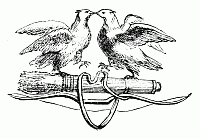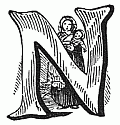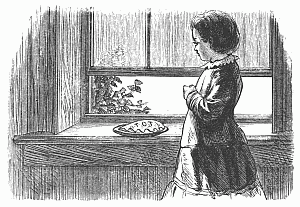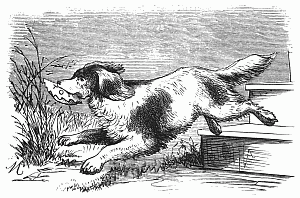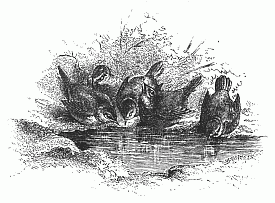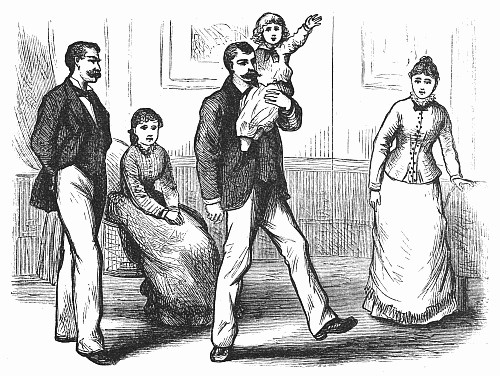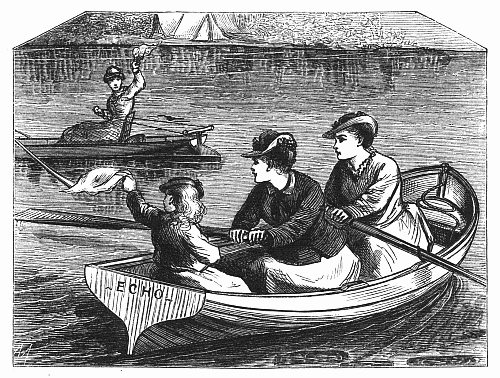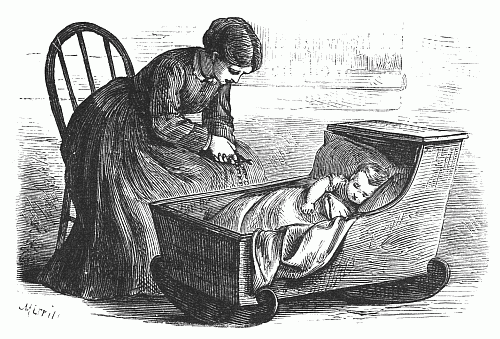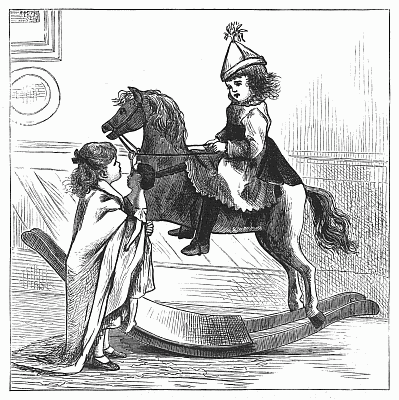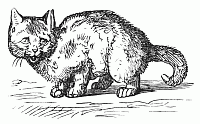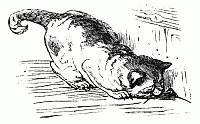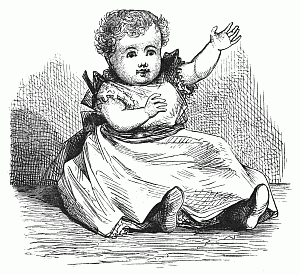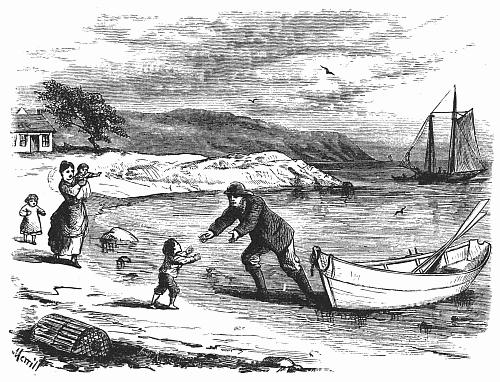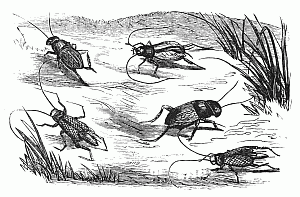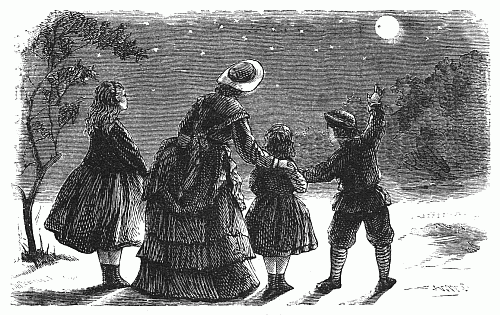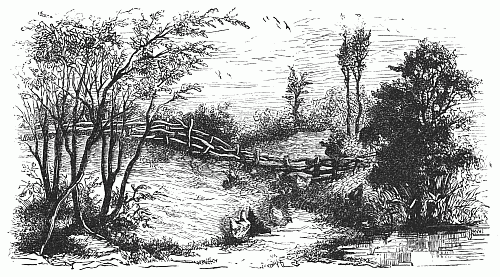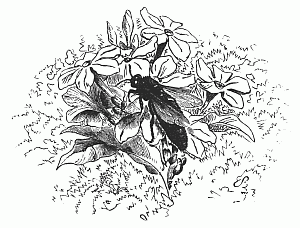Project Gutenberg's The Nursery, June 1877, Vol. XXI. No. 6, by Various
This eBook is for the use of anyone anywhere at no cost and with
almost no restrictions whatsoever. You may copy it, give it away or
re-use it under the terms of the Project Gutenberg License included
with this eBook or online at www.gutenberg.org
Title: The Nursery, June 1877, Vol. XXI. No. 6
A Monthly Magazine for Youngest Readers
Author: Various
Release Date: February 20, 2009 [EBook #28134]
Language: English
Character set encoding: ISO-8859-1
*** START OF THIS PROJECT GUTENBERG EBOOK THE NURSERY, JUNE 1877 ***
Produced by Emmy, Juliet Sutherland and the Online
Distributed Proofreading Team at http://www.pgdp.net.
THE
NURSERY
A Monthly Magazine
For Youngest Readers.
VOLUME XXI.—No. 6.
BOSTON:
JOHN L. SHOREY, No. 36 BROMFIELD STREET,
1877.
Entered according to Act of Congress, in the year 1877, by
JOHN L. SHOREY,
In the Office of the Librarian of Congress at Washington.
FRANKLIN PRESS:
RAND, AVERY, AND COMPANY,
117 FRANKLIN STREET,
BOSTON.
IN PROSE.
| Arthur's New Sloop | 161 |
| A True Story | 164 |
| Playing Soldier | 167 |
| Madie's Visit at Grandma's | 168 |
| What I overheard | 170 |
| The Encounter | 173 |
| Jamie's Letter to a Little Uncle | 174 |
| The Disappointed Kitty | 175 |
| The Mare and her Colt | 177 |
| The Fisherman's Return | 180 |
| More about Crickets | 183 |
| Fifth Lesson in Astronomy | 185 |
IN VERSE.
| Tot's Turnover | 163 |
| The Kingfisher | 166 |
| Bye-Lo-Land | 171 |
| Kissing a Sunbeam | 179 |
| The Puppy and the Wasp | 182 |
| June | 187 |
[161]
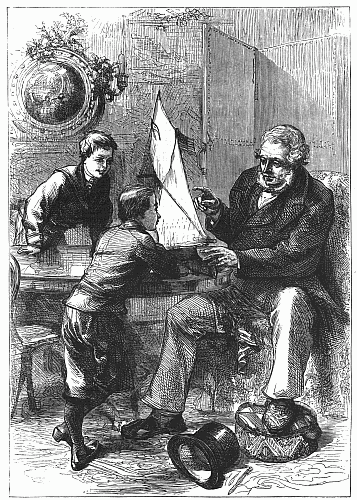 ARTHUR'S NEW SLOOP.
ARTHUR'S NEW SLOOP.
[162]
ARTHUR'S NEW SLOOP.
OW, boys," said Uncle Martin, "if you were at
sea in a vessel like this, what should you do
when you saw a squall coming up?"
"I should take in all sail, and scud under
bare poles," said Arthur.
"But what if you did not want to be blown ashore?"
"Then I should leave out the first reef, so as to catch as
much wind as I could risk, and steer for the sea, the sea, the
open sea."
"Well, that's pretty well said, though not just as a sailor
would say it. Look here, Henry, where is the stern?"
"You have your left hand on it, sir."
"That's true. And where's the rudder?"
"Your little finger is resting on it."
"What sort of a craft do you call this?"
"I call it a sloop; for it has but one mast."
"If you were holding the tiller, and I were to say, 'Larboard'
or 'port,' what should you do?"
"If I stood looking forward, I should move the tiller to
the left side of the vessel."
"That's right; and, if I said 'Starboard,' you would move
the tiller to the right side.—Now, boys, which of you can
tell me the difference between a tiller and a helm?"
"I always thought," said Arthur, "that they meant pretty
much the same thing."
"No: the difference is this," said Uncle Martin: "A tiller
is this little bar or handle by which I move the rudder.
The helm is the whole of the things for steering, consisting
of a rudder, a tiller, and, in large vessels, a wheel by which
the tiller is moved. So a tiller is only a part of the helm."[163]
"Yes, now I understand," said Arthur. "How jolly it is
to have an Uncle Martin to explain things!"
"You rogue, you expect me to be at the launch, eh?"
"Yes, uncle: I've got a bottle of hard cider to smash, on
the occasion. It ought to be rum, by the old rule."
"The best thing to do with rum is to pour it into the
sea," said Uncle Martin. "But what's the name of the new
sloop?"
"Ah! that you will hear at the launch," said Arthur.
"It's the 'Artful Dodger,'" whispered brother Henry.
Alfred Selwyn.
TOT'S TURNOVER.
Sugared and scalloped and cut as you see,
With juicy red wreath and name,
t-o-t,
This is the turnover dear little Tot
Set in the window there all piping hot:
Proud of her work, she has left it to cool:
[164]Benny must share it when he's out of school.
Scenting its flavor, Prince happens that way,
Wonders if Tot will give him some to-day.
Benny is coming, he's now at the gate—
Prince for himself decides not to wait.
Oh, pity! 'tis gone, and here you and I
See the last that Tot saw of that pretty pie.
M. A. C.
A TRUE STORY.
Once, when I lived in the country, some robins built a
nest in a lilac-bush in the garden. One day I looked in the
nest, and saw one little green egg. Two or three days after,
I saw three more little green eggs, and pretty soon what did
I see there but four little cunning baby-birdies?
The old birds seemed so happy as they fed their little
ones, who opened their mouths wide to take the food in,
that I loved dearly to watch them.
One night there came a terrible storm of wind and rain.
When I awoke in the morning, and opened my window,[165]
there were the old robins flying about the garden in great
distress, making such a dreadful cry, that I went out to see
what was the matter. What do you think I saw?
The pretty nest was on the ground, torn in pieces by the
wind; and the little baby-birds lay in the cold wet grass,
crying pitifully. The old birds were flying about, and
beating the grass with their wings.
I ran to the house, and found an old tin pail. I lined this
with nice hay from Billy's stable, picked up the poor little
robins, and put them in the warm dry hay. Then I hung
the pail on a branch of the bush, tied it firmly with some
twine, and went into the house to watch the old birds from
my window.
They looked first on one side, then on the other, to see
that there was nobody near. At last they flew to the old
pail, and stood on its edge. Pretty soon they began to sing
as if they were just as happy as they could be.
I think they liked the old pail just as well as their pretty
nest; for they lived in it till the little baby-birdies were
able to fly, and to feed themselves.
One day I looked in the pail, and it was empty. The
birdies had grown up, and had flown away.
Hannah Paulding.
[166]
THE KINGFISHER.
Where the white lilies quiver
By the sedge in the river,
I fly in and out,
I hunt all about;
For I am the daring kingfisher,
kingfisher!
Rod and line have not I,
But, a fish when I spy,
From the tree-top I start,
And down, down, I dart;
For I am the daring kingfisher, kingfisher!
My dinner I make,
My pleasure I take,
And the fish must be quick
That would parry my trick;
For I am the daring kingfisher, kingfisher!
Now summer is near,
And the boys will be here;
But I fly or I run,
When I look on a gun,
Tho' I am the daring kingfisher, kingfisher!
Emily Carter.
[167]
PLAYING SOLDIER.
Little Mary lives in Boston. She has no brothers or
sisters to play with her, and no mother. But her papa
plays with her a great deal.
There is one game she has with him that is very entertaining
to others who are looking on. At least so her
aunts and uncles thought on Thanksgiving evening, when
it was played for their amusement. I have called the game
"Playing soldier." Mary was the captain; and her papa
was the soldier.
This is the way it was done: Mary went to her papa, who
was standing, and placed herself in front of him, with her
back against him. "Shoulder arms!" shouted the little
captain; and her tall soldier immediately put her on his
left shoulder, in imitation of the real soldier, who holds
his musket or gun against that place.[168]
"Forward march!" shouted our little captain again; and
her soldier marched forward with a quick step.
"Halt!" cried she after he had marched back; and he
stopped at once.
"Ground arms!" was the next command; and the soldier
put his captain down on the floor in front of him just as
she had stood before—and the play was over.
M.
MADIE'S VISIT AT GRANDMA'S.
Madie is a dear little girl who lives in a pretty village
in the State of New York. Every summer she goes to visit
her grandmother, whose home is at Bay View, near a
beautiful body of water called Henderson Bay, a part of
Lake Ontario.
She is very happy at Bay View; for, besides grandma,
there are an uncle and two aunts, who are never too busy
to swing her in the hammock, out under the maples, or play
croquet with her on the lawn.
Sometimes she drives out with her uncle behind his black
ponies; and, if the road is smooth and level, he lets Madie
hold the reins. But she likes better to go with him on the
water, in his fine sail-boat, "Ildrian," which is a Spanish
name, and means "fleet as lightning."
When the weather is fine, and the water is calm, her
aunts take her out rowing in their pretty row-boat, "Echo."
As they row along by the shore, stopping now and then to
gather water-lilies, Madie looks at the pretty cottages and
white tents nestled among the green trees, where the city
people are spending their summer.
They pass many boats on the way, filled with ladies and[169]
gentlemen, who give them a gay salute; and Madie waves
her handkerchief in one hand, and her little flag in the other,
as they go by. Sometimes they go ashore in a shady cove;
and Aunt Clara fills her basket with ferns and moss, while
Madie picks up shells and gay-colored stones on the beach.
But these lovely summer-days go by quickly. October
comes, and with it Madie's mamma, to claim her little girl,
who is so tanned and rosy, that mamma calls her, "Gypsy,"
and thinks papa will hardly know his little "sunbeam"
now.
So Madie kisses everybody "good-by" a great many
times,—even the bay-colt in the pasture, and the four
smutty kittens at the barn,—and goes back to her own
home. But, when the sweet June roses bloom again, she
will go once more to Bay View, which she thinks is the
nicest place in the world.
Merle Armour.
[170]
WHAT I OVERHEARD.
One day last summer, at the great Centennial Exhibition
in Philadelphia, I overheard a conversation that interested
me very much. The subject of it was a queer little animal
called a "gopher," which sat stuck up in a case with its
comical little head perched up in the air; for it wasn't
even alive, but was a poor little stuffed gopher.
In front of the case I noticed two farmers, who were
talking about my little friend in a very earnest way: so I
listened to their remarks.
"Yes," said one, "I tell you he is a dreadful creature to
dig. Why, he makes us a sight of trouble out our way!
can't keep anything that he can dig for, away from him."
"Is that so?" said the other man.
"Yes. Why, I pay my boys five cents for every one of
'em they catch; and it's lively work getting 'em, I tell you!
See his nose, now! doesn't that look sharp? I tell you,
when that fellow gets hold of a job, he keeps right at it!
There is no giving up in him."
"Dear me!" thought I, "how nice of little gopher! Ugly
as he is, I quite fall in love with him." And I drew nearer,
and showed, I suppose, my interest in my face; for the
speaker turned around, and addressed me.
"Yes, ma'am, he steals my potatoes, and does lots of
mischief. Just look at those paws of his! Doesn't he keep
them busy, though!"
"Are gophers so very industrious, then?" I asked.
"Industrious, ma'am! Well, yes: they've got the work
in them, that's true; and, if they begin any thing, they'll
see it through. They don't sit down discouraged, and give
up; but they keep right on, even when there's no hope.
Oh, they're brave little fellows!" And the honest old[171]
farmer beamed in admiration upon the stiff, little unconscious
specimen before us in the case.
"It is very interesting," I said, "to know of such patience
in a little animal like this."
"Yes, ma'am," he responded: "you would think so if
you could see one. Why, working is their life. If they
couldn't work, they'd die. I know, 'cause I've proved it.
Once, we caught one, and I put him in a box, and my boys
and I threw in some sand. The box was considerably
big, and the little fellow went right to work. He dug, and
threw it all back of him over to the other side; then back
of him again, till he went through that sand I don't know
how many times. Well, he was as lively as a cricket, and,
to try what he would do, I took away the sand, and 'twas
but a few hours before he was dead. Yes, dead, ma'am!
just as dead as this one, here!" pointing with his finger to
our friend in the case, who preserved a stolid indifference
to the fate of his gopher-cousin.
I stopped to take a further look at "little gopher," with
whom I felt pretty well acquainted by this time.
H. M. S.
BYE-LO-LAND.
Baby is going to Bye-lo-land,
Going to see the sights so grand:
Out of the sky the wee stars peep,
Watching to see her fast asleep.
Swing so,
Bye-lo!
[172]Over the hills to Bye-lo-land.
Oh the bright dreams in Bye-lo-land,
All by the loving angels planned!
Soft little lashes downward close,
Just like the petals of a rose.
Swing so,
Bye-lo!
Prettiest eyes in Bye-lo-land!
Sweet is the way to Bye-lo-land,
Guided by mother's gentle hand.
Little lambs now are in the fold,
Little birds nestle from the cold.
Swing so,
Bye-lo!
Baby is safe in Bye-lo-land!
George Cooper.
[173]
THE ENCOUNTER.
Mr. Jones.—Good-morning, madam. It is a fine day.
Are you going out for a walk?
Mrs. Smith.—I was just taking my little Aldabella out
for an airing. Poor child! She has been kept in the house
so long by the bad weather, that she has lost all her color.
Mr. Jones.—Be careful, and don't let her catch the
whooping-cough.
Mrs. Smith.—O sir! you alarm me. Is it much about?
Mr. Jones.—Yes, ma'am: so is the measles. I know[174]
two gentlemen who were kept away from their base-ball
last Saturday afternoon by the measles.
Mrs. Smith.—What an affliction! Is that horse of
yours safe? Does he ever kick?
Mr. Jones.—I never knew him to kick in my life; but,
as you see, he is a little restive: he may step on your toes.
Mrs. Smith.—Oh, pray hold him in, Mr. Jones! Don't
let him be so gay.
Mr. Jones.—Madam, my horse seems to be of the
opinion that we have talked long enough: so I will wish
you a very good-morning.
Mrs. Smith.—Good-morning, Mr. Jones. Pray don't
run over any little boys in the street.
Mr. Jones.—Little boys must not come in my way.
Good-by, Mrs. Smith! Good-by, Miss Aldabella!
JAMIE'S LETTER TO A LITTLE UNCLE.
My dear little Uncle,—You see I have not forgotten
that long ago you wrote me a letter. My mamma told me
to-night that she would answer it for me, because something
happened yesterday that I want you to know.
You remember it was May-day. Mamma said, "Jamie,
you are too little a boy to go out in the fields and woods
Maying." That made me feel badly, because the sun was
shining so brightly, and the grass looked so green, that I was
sure there were plenty of flowers hidden away in the fields.
So I thought, "What can a little boy do? I am so
little, I can't walk. I am so little, I can't talk much. I
can creep, but when I get to a nice bit on the floor and
put it into my mouth, mamma jumps, and takes it away,[175]
and says, 'No, no, baby!' What can I do? what can I do
to please everybody?"
At last I thought of something. I was sitting in mamma's
lap, when, all at once, she called out, "Aunt Fanny, come
here and put your thimble in the baby's mouth. I'm sure
that's a tooth." And, sure enough, one little tooth had just
peeped out. Then everybody said, "Baby has a tooth!"
I didn't tell them that I went Maying all by myself, and
found that little tooth; but I tell you as a secret, little uncle.
Dear little uncle, I am growing very big. Next summer
I can run on the beach with you, and dig in the sand.
Now you must kiss my grandmamma for me; give her a
kiss on her right eye, her left cheek, her nose, and her lips,
and whisper in her ear that I love her very much; then
pull my grandpapa's whiskers, and give him two kisses;
then give a kiss to all my uncles and aunts, and take one
for yourself from your little nephew,
Jamie.
THE DISAPPOINTED KITTY.
The name of my kitten is Breezy.
I gave her that name because she
is never quiet. When she cannot
frolic, she mews; but, as she is
frolicking all the time when she is
not asleep, she does not make much of an outcry, after all.
It has been the height of Breezy's ambition to catch a
mouse. The other day, I was sitting in my little arm-chair,
studying my spelling-lesson, when what should come forth
from under the cupboard but a wee mouse not much bigger
than the bowl of a teaspoon.[176]
Breezy, for a wonder, was asleep on the rug. Mousie
looked around, as if in search of some crumbs. I put down
my book, and kept very still. Which did I favor in my
heart,—Mousie, or Breezy?
To tell the truth, my sympathies were divided. The little
bright-eyed mouse was so cunning and swift, that I thought
to myself, "What a pity to kill such a bright little fellow!"
But then I knew how disappointed poor Breezy would be,
if she should wake, and learn somehow that a mouse had
run over the floor while she was indulging in inglorious
slumber.
Out came mousie quite boldly, and, finding some crumbs
under the table, nibbled at them in great haste. Poor little
fellow, if I had had a bit of cheese, I should have been
tempted to give it to him, there and then.
But, all at once, Breezy woke, and saw what was going on.
Mousie, however, had not been so stupid, while making his
meal, as not to keep one eye open on his enemy. Quick as a
flash he ran for the little crack that led under the cupboard,
and thus made his escape.
Poor Breezy! She seemed really ashamed of herself.
She had her nose at that crack a full hour after mousie had
escaped. It seemed as if she could not get over her disappointment.
Every day since then she has patiently
watched the cupboard. Will mousie give her another
chance? That remains to be seen.
Fanny Everton.
[177]
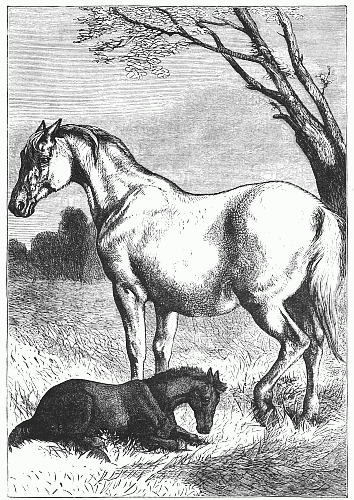 THE MARE AND HER COLT.
THE MARE AND HER COLT.
[178]
THE MARE AND HER COLT.
Here is a picture of the
mare and her colt. The old
mare is almost white; but the
colt is jet black. He is a bright
little fellow, and I am sure that
his mother is proud of him.
Our Willie likes to stand at
the bars of the pasture and
look at the colt. He often
comes so near that the little
boy pats him on the head.
Willie has named the colt
"Frisky," because he is so very
lively. He is so nimble with
his heels, that it is not safe for
a small boy to go very near
him now; but Willie expects
to ride him by and by.
A. B. C.
[179]
KISSING A SUNBEAM.
Little Baby Brown-Eyes
Sitting on the floor,
Every thing around him
Ready to explore,
Plumpy, dumpy, roly-poly,
Pretty Baby Brown-Eyes
Sitting on the floor!
Flutters in a sunbeam
Through the open door,
Like a golden butterfly
Silently before
Plumpy, dumpy, roly-poly,
Pretty Baby Brown-Eyes
Sitting on the floor.
See his little fingers
Eager for a prize,
And the hungry gladness
Laughing in his eyes!
Plumpy, dumpy, roly-poly,
Pretty Baby Brown-Eyes
Capturing a prize!
Plucking at the sunbeam
With his finger-tips,
Tenderly he lifts them
To his rosy lips;
Plumpy, dumpy, roly-poly,
Pretty Baby Brown-Eyes
[180]Kissing the pink tips!
Brother of the sunbeam,
With your browny eyes,
Greet your silent sister,
Stealing from the skies;
Plumpy, dumpy, roly-poly,
Pretty Baby Brown-Eyes
Kiss her as she flies!
Mamma catches sunbeams
In your laughing eye,
Hiding in your dimples,
Peeping very sly:
Plumpy, dumpy, roly-poly,
Pretty Baby Brown-Eyes,
She'll kiss them on the fly!
George S. Burleigh.
THE FISHERMAN'S RETURN HOME.
"Father is coming! Father is coming!" was little
Tim's cry, as he sat at the window of the little house by
the seashore.
"How do you know he is coming?" said mother, who
was tending the baby, and at the same time trying to sew
up the seams of a dress for Miss Bella, the second child.
"I know he is coming, because I can see him in his boat,"
cried Tim. "Hurrah, hurrah! I'll be the first one at the
landing."
Mamma was by this time satisfied that her husband, Mr.
Payson, was indeed in sight. He was a fisherman, and had
been absent, on a trip to the Banks of Newfoundland, more
than six weeks. There had been many storms during that
time, and she had passed some anxious moments.
But now there he was before her eyes, safe and sound.
"Come, Bella," she said, "let us see if we can't get the
first kiss."
"No, no, I'll get it!" cried Tim, starting on the run for
the landing-place.
Sure enough, Tim got the first kiss; but mother's and[181]
baby's and Bella's soon followed; and so there was no
complaint.
Mr. Payson had made a prosperous trip. His schooner
lay off the point, and he had sold his fish at a good profit.
How glad he was to get home, and find his family well!
Tim brought him his primer, and proudly pointed to the
pages he could read. Bella showed her first attempts at
sewing; and, as for baby, she showed how well she could
crow and frolic.
"I've found the first violet, papa," cried Bella.
"But I saw it first," said Tim.
"And I smelt of it first," said mother.
"And baby pulled it to pieces first," added Bella.
It was a happy meeting; and father and mother agreed
that to come home and find all the little ones well and
happy was better even than to sell his fish at a good price.
Uncle Charles.
[182]
THE PUPPY AND THE WASP.
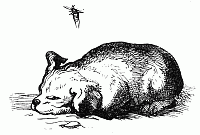
| As asleep I was lying,
My ear on the ground,
A queer thing came flying
And humming around.
Humming and coming
Close to my ear:
Shall I never be quiet?
O dear, and O dear!
|
You bold little teaser,
Now take yourself off;
Of your buzzing and fussing
I've had quite enough.
You will not? Tormentor,
I mean to rest here,
So mind how you vex me,
And come not too near.
| 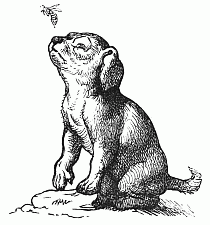
|
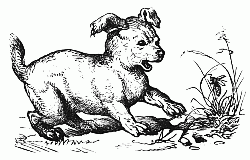
| You dare to defy me?
You come all the bolder?
I'll punish you, rash one,
Ere I'm a breath older.
With my big paw uplifted
I'll crush you to dust:
Shoo! What a dodger!
Leave me—you must!
|
I'll bite you, I'll kill you,
I snap and I spring:
If I only could catch you,
You rude saucy thing!
If you were not so little,
So cunning and spry,
I'd punish you quickly,
Pert wretch! you should die.[183]
| 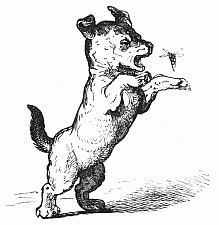
|
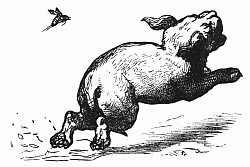
| It darts quick as lightning,—
O woe, and O woe!
On the nose it has stung me:
O, it burns and smarts so!
It pains like a needle,
It gives me no rest;
Oh, the wasp is a creature
I hate and detest.
|
He knows he has hurt me,
Away now he darts;
Oh, poor little puppy!
It smarts and it smarts!
To think such an insect
Should worry a dog!
He could not have hurt me,
If I'd been a log!
| 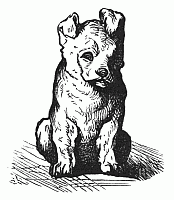
|

MORE ABOUT CRICKETS.
We keep crickets in a box, and find them very interesting.
They are very active, and occupy themselves in
laying eggs, digging holes, eating, singing, and running.
Only the males sing, and their wings are very rough, and
curiously marked.
Crickets have four different kinds of wings,—yellow,
brown, black, and brownish-red. Those that have yellow
wings seem to be less hardy than the others. They do not
sing so well, but lay and eat more.
The brown-winged crickets are quite common, but not so
common as the black-winged, which are the most common
of all kinds. Brownish-red crickets are very rare. Those[184]
that are black with yellow spots where the wings come out,
sing the best.
The eggs are yellow, about an eighth of an inch long, and
of an oval shape.
When we were in Lynn, a very handsome yellow-winged
singer came into the box, and ate three crickets. We put
him in another box with his mate, which he brought with
him. In the same box were a large female, and a common
sized white-winged cricket, both of which he ate.
Afterwards we found in his place a black-winged singer,
somewhat smaller than the yellow-winged one was; but his
mate remained the same as before.
Some spiders make holes in the ground, and, when the
crickets go into them, the spiders eat them.
The male crickets fight with each other, singing all the
while; and the one that beats sings on, all the louder.
There is another kind of cricket that is a great deal
smaller, and sings much longer, in an undertone. Its
wings are always yellow or brown; but we do not know
much about crickets of this kind, except that their habits
are similar to those of the large ones, and that they are
very numerous.
Herbert and Ella Lyman.
[185]
FIFTH LESSON IN ASTRONOMY.
"A little boy was dreaming,
Upon his nurse's lap,
That the pins fell out of all the stars,
And the stars fell into his cap.
So, when his dream was over,
What should that little boy do?
Why, he went and looked inside his cap—
And found it wasn't true."
If that little boy had been wide awake, and out of doors,
with his cap on his head, instead of dreaming in his nurse's
lap, don't you think he might really have seen a star
fall out of the sky? Haven't you all seen one many a
time?
But you would never dream that those blazing suns, the
stars, are pinned into the sky, and that they might tumble
into your cap if the pins fell out. You know better than[186]
that; but do you know what does happen when a star
falls?
We say, "A star falls," because what we see falling looks
to us like a star; but it really is no more like a star than a
lump of coal. If we should see a piece of blazing coal
falling through the air, we might be foolish enough to think
that, too, was a star. And what we call a shooting star is,
perhaps, more like a lump of coal on fire than like any thing
else you know of.
Sometimes these shooting stars fall to the ground, and are
picked up and found to be rocks. How do you suppose
they take fire? It is by striking against the air which is
around our earth. They come from nobody knows where,
and are no more on fire than any rock is, until they fall into
our air; and that sets them blazing, just as a match lights
when you rub it against something.
These meteors, as they are called, do not often fall to the
ground; only the very large ones last until they reach
the earth; most of them burn up on their way down. I
think that is lucky, because they might at any time fall into
some little boy's cap and spoil it, and might even fall on his
head, if they were in the habit of falling anywhere.
That little boy who thought the stars were only pinned
in their places must have felt very uneasy. I don't wonder
that he dreamed about them.
Once in a great while, a shower of meteors rains down
upon the earth; and sometimes many of them can be seen
falling from the sky, and burning up in the air.
The fall of the year is the best time for meteors; but you
will be pretty sure to see one any evening you choose to
look for it, and, perhaps, on the Fourth of July one of them
will celebrate the day by bursting like a rocket, as they
sometimes do.
M. E. R.
[187]
JUNE.
The pretty flowers have come again,
The roses and the daisies;
And from the trees, oh, hear how plain
The birds are singing praises!
The grass is fresh and green once more;
The sky is clear and sunny;
And bees are laying in a store
Of pure and golden honey.
The little modest buttercup,
The dandelion splendid,
Their heads are bravely holding up,
[188]Now winter's reign is ended.
How charming now our walks will be
By meadows full of clover,
Through shady lanes, where we can see
The branches bending over!
The flowers are blooming fresh and bright
In just the same old places,
And oh, it fills me with delight
To see their charming faces.
The air is sweet, the sky is blue,
The woods with songs are ringing;
And I'm so happy, that I, too,
Can hardly keep from singing.
Josephine Pollard.
Transcriber's Notes
Transcriber's Notes:
The January edition of the Nursery had a table of contents for the first
six issues of the year. This table was divided to cover each specific
issue. A title page copied from the January edition was also used for
this number.
End of Project Gutenberg's The Nursery, June 1877, Vol. XXI. No. 6, by Various
*** END OF THIS PROJECT GUTENBERG EBOOK THE NURSERY, JUNE 1877 ***
***** This file should be named 28134-h.htm or 28134-h.zip *****
This and all associated files of various formats will be found in:
http://www.gutenberg.org/2/8/1/3/28134/
Produced by Emmy, Juliet Sutherland and the Online
Distributed Proofreading Team at http://www.pgdp.net.
Updated editions will replace the previous one--the old editions
will be renamed.
Creating the works from public domain print editions means that no
one owns a United States copyright in these works, so the Foundation
(and you!) can copy and distribute it in the United States without
permission and without paying copyright royalties. Special rules,
set forth in the General Terms of Use part of this license, apply to
copying and distributing Project Gutenberg-tm electronic works to
protect the PROJECT GUTENBERG-tm concept and trademark. Project
Gutenberg is a registered trademark, and may not be used if you
charge for the eBooks, unless you receive specific permission. If you
do not charge anything for copies of this eBook, complying with the
rules is very easy. You may use this eBook for nearly any purpose
such as creation of derivative works, reports, performances and
research. They may be modified and printed and given away--you may do
practically ANYTHING with public domain eBooks. Redistribution is
subject to the trademark license, especially commercial
redistribution.
*** START: FULL LICENSE ***
THE FULL PROJECT GUTENBERG LICENSE
PLEASE READ THIS BEFORE YOU DISTRIBUTE OR USE THIS WORK
To protect the Project Gutenberg-tm mission of promoting the free
distribution of electronic works, by using or distributing this work
(or any other work associated in any way with the phrase "Project
Gutenberg"), you agree to comply with all the terms of the Full Project
Gutenberg-tm License (available with this file or online at
http://gutenberg.org/license).
Section 1. General Terms of Use and Redistributing Project Gutenberg-tm
electronic works
1.A. By reading or using any part of this Project Gutenberg-tm
electronic work, you indicate that you have read, understand, agree to
and accept all the terms of this license and intellectual property
(trademark/copyright) agreement. If you do not agree to abide by all
the terms of this agreement, you must cease using and return or destroy
all copies of Project Gutenberg-tm electronic works in your possession.
If you paid a fee for obtaining a copy of or access to a Project
Gutenberg-tm electronic work and you do not agree to be bound by the
terms of this agreement, you may obtain a refund from the person or
entity to whom you paid the fee as set forth in paragraph 1.E.8.
1.B. "Project Gutenberg" is a registered trademark. It may only be
used on or associated in any way with an electronic work by people who
agree to be bound by the terms of this agreement. There are a few
things that you can do with most Project Gutenberg-tm electronic works
even without complying with the full terms of this agreement. See
paragraph 1.C below. There are a lot of things you can do with Project
Gutenberg-tm electronic works if you follow the terms of this agreement
and help preserve free future access to Project Gutenberg-tm electronic
works. See paragraph 1.E below.
1.C. The Project Gutenberg Literary Archive Foundation ("the Foundation"
or PGLAF), owns a compilation copyright in the collection of Project
Gutenberg-tm electronic works. Nearly all the individual works in the
collection are in the public domain in the United States. If an
individual work is in the public domain in the United States and you are
located in the United States, we do not claim a right to prevent you from
copying, distributing, performing, displaying or creating derivative
works based on the work as long as all references to Project Gutenberg
are removed. Of course, we hope that you will support the Project
Gutenberg-tm mission of promoting free access to electronic works by
freely sharing Project Gutenberg-tm works in compliance with the terms of
this agreement for keeping the Project Gutenberg-tm name associated with
the work. You can easily comply with the terms of this agreement by
keeping this work in the same format with its attached full Project
Gutenberg-tm License when you share it without charge with others.
1.D. The copyright laws of the place where you are located also govern
what you can do with this work. Copyright laws in most countries are in
a constant state of change. If you are outside the United States, check
the laws of your country in addition to the terms of this agreement
before downloading, copying, displaying, performing, distributing or
creating derivative works based on this work or any other Project
Gutenberg-tm work. The Foundation makes no representations concerning
the copyright status of any work in any country outside the United
States.
1.E. Unless you have removed all references to Project Gutenberg:
1.E.1. The following sentence, with active links to, or other immediate
access to, the full Project Gutenberg-tm License must appear prominently
whenever any copy of a Project Gutenberg-tm work (any work on which the
phrase "Project Gutenberg" appears, or with which the phrase "Project
Gutenberg" is associated) is accessed, displayed, performed, viewed,
copied or distributed:
This eBook is for the use of anyone anywhere at no cost and with
almost no restrictions whatsoever. You may copy it, give it away or
re-use it under the terms of the Project Gutenberg License included
with this eBook or online at www.gutenberg.org
1.E.2. If an individual Project Gutenberg-tm electronic work is derived
from the public domain (does not contain a notice indicating that it is
posted with permission of the copyright holder), the work can be copied
and distributed to anyone in the United States without paying any fees
or charges. If you are redistributing or providing access to a work
with the phrase "Project Gutenberg" associated with or appearing on the
work, you must comply either with the requirements of paragraphs 1.E.1
through 1.E.7 or obtain permission for the use of the work and the
Project Gutenberg-tm trademark as set forth in paragraphs 1.E.8 or
1.E.9.
1.E.3. If an individual Project Gutenberg-tm electronic work is posted
with the permission of the copyright holder, your use and distribution
must comply with both paragraphs 1.E.1 through 1.E.7 and any additional
terms imposed by the copyright holder. Additional terms will be linked
to the Project Gutenberg-tm License for all works posted with the
permission of the copyright holder found at the beginning of this work.
1.E.4. Do not unlink or detach or remove the full Project Gutenberg-tm
License terms from this work, or any files containing a part of this
work or any other work associated with Project Gutenberg-tm.
1.E.5. Do not copy, display, perform, distribute or redistribute this
electronic work, or any part of this electronic work, without
prominently displaying the sentence set forth in paragraph 1.E.1 with
active links or immediate access to the full terms of the Project
Gutenberg-tm License.
1.E.6. You may convert to and distribute this work in any binary,
compressed, marked up, nonproprietary or proprietary form, including any
word processing or hypertext form. However, if you provide access to or
distribute copies of a Project Gutenberg-tm work in a format other than
"Plain Vanilla ASCII" or other format used in the official version
posted on the official Project Gutenberg-tm web site (www.gutenberg.org),
you must, at no additional cost, fee or expense to the user, provide a
copy, a means of exporting a copy, or a means of obtaining a copy upon
request, of the work in its original "Plain Vanilla ASCII" or other
form. Any alternate format must include the full Project Gutenberg-tm
License as specified in paragraph 1.E.1.
1.E.7. Do not charge a fee for access to, viewing, displaying,
performing, copying or distributing any Project Gutenberg-tm works
unless you comply with paragraph 1.E.8 or 1.E.9.
1.E.8. You may charge a reasonable fee for copies of or providing
access to or distributing Project Gutenberg-tm electronic works provided
that
- You pay a royalty fee of 20% of the gross profits you derive from
the use of Project Gutenberg-tm works calculated using the method
you already use to calculate your applicable taxes. The fee is
owed to the owner of the Project Gutenberg-tm trademark, but he
has agreed to donate royalties under this paragraph to the
Project Gutenberg Literary Archive Foundation. Royalty payments
must be paid within 60 days following each date on which you
prepare (or are legally required to prepare) your periodic tax
returns. Royalty payments should be clearly marked as such and
sent to the Project Gutenberg Literary Archive Foundation at the
address specified in Section 4, "Information about donations to
the Project Gutenberg Literary Archive Foundation."
- You provide a full refund of any money paid by a user who notifies
you in writing (or by e-mail) within 30 days of receipt that s/he
does not agree to the terms of the full Project Gutenberg-tm
License. You must require such a user to return or
destroy all copies of the works possessed in a physical medium
and discontinue all use of and all access to other copies of
Project Gutenberg-tm works.
- You provide, in accordance with paragraph 1.F.3, a full refund of any
money paid for a work or a replacement copy, if a defect in the
electronic work is discovered and reported to you within 90 days
of receipt of the work.
- You comply with all other terms of this agreement for free
distribution of Project Gutenberg-tm works.
1.E.9. If you wish to charge a fee or distribute a Project Gutenberg-tm
electronic work or group of works on different terms than are set
forth in this agreement, you must obtain permission in writing from
both the Project Gutenberg Literary Archive Foundation and Michael
Hart, the owner of the Project Gutenberg-tm trademark. Contact the
Foundation as set forth in Section 3 below.
1.F.
1.F.1. Project Gutenberg volunteers and employees expend considerable
effort to identify, do copyright research on, transcribe and proofread
public domain works in creating the Project Gutenberg-tm
collection. Despite these efforts, Project Gutenberg-tm electronic
works, and the medium on which they may be stored, may contain
"Defects," such as, but not limited to, incomplete, inaccurate or
corrupt data, transcription errors, a copyright or other intellectual
property infringement, a defective or damaged disk or other medium, a
computer virus, or computer codes that damage or cannot be read by
your equipment.
1.F.2. LIMITED WARRANTY, DISCLAIMER OF DAMAGES - Except for the "Right
of Replacement or Refund" described in paragraph 1.F.3, the Project
Gutenberg Literary Archive Foundation, the owner of the Project
Gutenberg-tm trademark, and any other party distributing a Project
Gutenberg-tm electronic work under this agreement, disclaim all
liability to you for damages, costs and expenses, including legal
fees. YOU AGREE THAT YOU HAVE NO REMEDIES FOR NEGLIGENCE, STRICT
LIABILITY, BREACH OF WARRANTY OR BREACH OF CONTRACT EXCEPT THOSE
PROVIDED IN PARAGRAPH F3. YOU AGREE THAT THE FOUNDATION, THE
TRADEMARK OWNER, AND ANY DISTRIBUTOR UNDER THIS AGREEMENT WILL NOT BE
LIABLE TO YOU FOR ACTUAL, DIRECT, INDIRECT, CONSEQUENTIAL, PUNITIVE OR
INCIDENTAL DAMAGES EVEN IF YOU GIVE NOTICE OF THE POSSIBILITY OF SUCH
DAMAGE.
1.F.3. LIMITED RIGHT OF REPLACEMENT OR REFUND - If you discover a
defect in this electronic work within 90 days of receiving it, you can
receive a refund of the money (if any) you paid for it by sending a
written explanation to the person you received the work from. If you
received the work on a physical medium, you must return the medium with
your written explanation. The person or entity that provided you with
the defective work may elect to provide a replacement copy in lieu of a
refund. If you received the work electronically, the person or entity
providing it to you may choose to give you a second opportunity to
receive the work electronically in lieu of a refund. If the second copy
is also defective, you may demand a refund in writing without further
opportunities to fix the problem.
1.F.4. Except for the limited right of replacement or refund set forth
in paragraph 1.F.3, this work is provided to you 'AS-IS' WITH NO OTHER
WARRANTIES OF ANY KIND, EXPRESS OR IMPLIED, INCLUDING BUT NOT LIMITED TO
WARRANTIES OF MERCHANTIBILITY OR FITNESS FOR ANY PURPOSE.
1.F.5. Some states do not allow disclaimers of certain implied
warranties or the exclusion or limitation of certain types of damages.
If any disclaimer or limitation set forth in this agreement violates the
law of the state applicable to this agreement, the agreement shall be
interpreted to make the maximum disclaimer or limitation permitted by
the applicable state law. The invalidity or unenforceability of any
provision of this agreement shall not void the remaining provisions.
1.F.6. INDEMNITY - You agree to indemnify and hold the Foundation, the
trademark owner, any agent or employee of the Foundation, anyone
providing copies of Project Gutenberg-tm electronic works in accordance
with this agreement, and any volunteers associated with the production,
promotion and distribution of Project Gutenberg-tm electronic works,
harmless from all liability, costs and expenses, including legal fees,
that arise directly or indirectly from any of the following which you do
or cause to occur: (a) distribution of this or any Project Gutenberg-tm
work, (b) alteration, modification, or additions or deletions to any
Project Gutenberg-tm work, and (c) any Defect you cause.
Section 2. Information about the Mission of Project Gutenberg-tm
Project Gutenberg-tm is synonymous with the free distribution of
electronic works in formats readable by the widest variety of computers
including obsolete, old, middle-aged and new computers. It exists
because of the efforts of hundreds of volunteers and donations from
people in all walks of life.
Volunteers and financial support to provide volunteers with the
assistance they need, are critical to reaching Project Gutenberg-tm's
goals and ensuring that the Project Gutenberg-tm collection will
remain freely available for generations to come. In 2001, the Project
Gutenberg Literary Archive Foundation was created to provide a secure
and permanent future for Project Gutenberg-tm and future generations.
To learn more about the Project Gutenberg Literary Archive Foundation
and how your efforts and donations can help, see Sections 3 and 4
and the Foundation web page at http://www.pglaf.org.
Section 3. Information about the Project Gutenberg Literary Archive
Foundation
The Project Gutenberg Literary Archive Foundation is a non profit
501(c)(3) educational corporation organized under the laws of the
state of Mississippi and granted tax exempt status by the Internal
Revenue Service. The Foundation's EIN or federal tax identification
number is 64-6221541. Its 501(c)(3) letter is posted at
http://pglaf.org/fundraising. Contributions to the Project Gutenberg
Literary Archive Foundation are tax deductible to the full extent
permitted by U.S. federal laws and your state's laws.
The Foundation's principal office is located at 4557 Melan Dr. S.
Fairbanks, AK, 99712., but its volunteers and employees are scattered
throughout numerous locations. Its business office is located at
809 North 1500 West, Salt Lake City, UT 84116, (801) 596-1887, email
[email protected]. Email contact links and up to date contact
information can be found at the Foundation's web site and official
page at http://pglaf.org
For additional contact information:
Dr. Gregory B. Newby
Chief Executive and Director
[email protected]
Section 4. Information about Donations to the Project Gutenberg
Literary Archive Foundation
Project Gutenberg-tm depends upon and cannot survive without wide
spread public support and donations to carry out its mission of
increasing the number of public domain and licensed works that can be
freely distributed in machine readable form accessible by the widest
array of equipment including outdated equipment. Many small donations
($1 to $5,000) are particularly important to maintaining tax exempt
status with the IRS.
The Foundation is committed to complying with the laws regulating
charities and charitable donations in all 50 states of the United
States. Compliance requirements are not uniform and it takes a
considerable effort, much paperwork and many fees to meet and keep up
with these requirements. We do not solicit donations in locations
where we have not received written confirmation of compliance. To
SEND DONATIONS or determine the status of compliance for any
particular state visit http://pglaf.org
While we cannot and do not solicit contributions from states where we
have not met the solicitation requirements, we know of no prohibition
against accepting unsolicited donations from donors in such states who
approach us with offers to donate.
International donations are gratefully accepted, but we cannot make
any statements concerning tax treatment of donations received from
outside the United States. U.S. laws alone swamp our small staff.
Please check the Project Gutenberg Web pages for current donation
methods and addresses. Donations are accepted in a number of other
ways including checks, online payments and credit card donations.
To donate, please visit: http://pglaf.org/donate
Section 5. General Information About Project Gutenberg-tm electronic
works.
Professor Michael S. Hart is the originator of the Project Gutenberg-tm
concept of a library of electronic works that could be freely shared
with anyone. For thirty years, he produced and distributed Project
Gutenberg-tm eBooks with only a loose network of volunteer support.
Project Gutenberg-tm eBooks are often created from several printed
editions, all of which are confirmed as Public Domain in the U.S.
unless a copyright notice is included. Thus, we do not necessarily
keep eBooks in compliance with any particular paper edition.
Most people start at our Web site which has the main PG search facility:
http://www.gutenberg.org
This Web site includes information about Project Gutenberg-tm,
including how to make donations to the Project Gutenberg Literary
Archive Foundation, how to help produce our new eBooks, and how to
subscribe to our email newsletter to hear about new eBooks.

